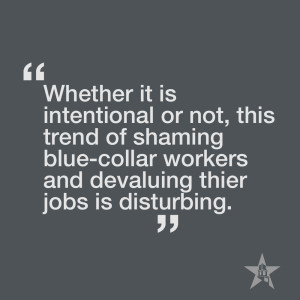The original impetus to write this article stemmed from a frustrating discussion on Marx and the plight of the proletariat in one of my philosophy courses, however things took off after I saw one of VOCA’s inserts on a table in the cafeteria. In advertising their resumé workshops, VOCA juxtaposed the outcomes of both a good and bad resumé. On the top half of one of the ads, VOCA slapped the bolded phrase “GOOD RESUME” over a white male dressed in business casual, sitting with his laptop in a high-rise office building; an image that screams moderate-to-high paying corporate job. The bottom half featured the phrase “NOT SO GOOD RESUME” superimposed over a grocery store worker pushing carts in from the snowy parking lot, dressed plainly in khakis, work boots, and a fluorescent vest; the typical effigy of the working class.
 VOCA’s message to Houghton students is anything but subtle: get your resume together or else you will end up like the poor sap working the dead-end job pushing carts, instead of sitting on a leather couch in a suit and tie. This is perhaps the most explicit shaming of the blue-collar worker and blue-collar jobs in general that I have seen thus far at Houghton. Last year’s “Theology +” advertisements to “find your calling” hinted at a similar message: a “calling” or a vocation is more than “just a job,” which is what I would guess most people here on campus would characterize blue-collar work as. This glorification of vocation over a simple job imposes an unavoidable value-judgment on those with a vocation versus those with “just a job.”
VOCA’s message to Houghton students is anything but subtle: get your resume together or else you will end up like the poor sap working the dead-end job pushing carts, instead of sitting on a leather couch in a suit and tie. This is perhaps the most explicit shaming of the blue-collar worker and blue-collar jobs in general that I have seen thus far at Houghton. Last year’s “Theology +” advertisements to “find your calling” hinted at a similar message: a “calling” or a vocation is more than “just a job,” which is what I would guess most people here on campus would characterize blue-collar work as. This glorification of vocation over a simple job imposes an unavoidable value-judgment on those with a vocation versus those with “just a job.”
Whether it is intentional or not, this trend of shaming blue-collar workers and devaluing their jobs is disturbing. I am well aware that those of us attending a private liberal arts college intend to find jobs in a more white-collar environment, and I want to clarify that I’m not attacking anyone’s desire or preference to do so. Regardless of the fact that Houghton plays a crucial role for those of us seeking these types of jobs, it does not give the institution or its members the right to devalue jobs. After all, there are plenty of blue-collar workers here at Houghton. How offensive is it for VOCA to put out these public advertisements that devalue their jobs, their livelihood, and their vocations?
I t should be no surprise to anyone here that people have an overwhelming tendency to equate a person with their job. Let me elaborate. People in suits, men and women who have their names on office doors and degrees hanging on their walls, are accorded respect and a sense of status by the vast majority. People who work at McDonald’s or wear fluorescent vests at work are rarely given the same level of respect, let alone thought of as having power or status in society. Thus, we equate the value of the work with the value of the person: those doing work that is valued higher socially (white-collar) are personally accorded more value and respect, while those working lesser valued jobs are, more often than not, seen as lesser in status, and thus given less respect and subsequently value. This value-driven attitude, however subconsciously it may arise, is reinforced practically everywhere–including Houghton–and inevitably, it creates a culture of white-collar superiority, so to speak.
t should be no surprise to anyone here that people have an overwhelming tendency to equate a person with their job. Let me elaborate. People in suits, men and women who have their names on office doors and degrees hanging on their walls, are accorded respect and a sense of status by the vast majority. People who work at McDonald’s or wear fluorescent vests at work are rarely given the same level of respect, let alone thought of as having power or status in society. Thus, we equate the value of the work with the value of the person: those doing work that is valued higher socially (white-collar) are personally accorded more value and respect, while those working lesser valued jobs are, more often than not, seen as lesser in status, and thus given less respect and subsequently value. This value-driven attitude, however subconsciously it may arise, is reinforced practically everywhere–including Houghton–and inevitably, it creates a culture of white-collar superiority, so to speak.
In emphasizing the importance of a vocation–and of a good resume to get there–the message that comes across emphasizes this attitude of inequality. It tells students: Do this or you’ll regret it. What I am proposing as the alternative is not some “how-to” on “grinning and bearing it” through some sort of blue-collar purgatory, rather a change in perspective on the value of “just a job”. Perhaps it is as simple as this: the value often awarded to white-collar jobs is based on some cost-benefit analysis related to various factors, happiness being a popular one. For some, money buys happiness, for others respect, power, and status do, ergo we flock to white-collar jobs. However, a recent survey done in 2012 by City & Guilds on “Career Happiness Index” shows that those with more blue-collar jobs (e.g. florists, hairdressers, and plumbers) have the highest happiness indexes that range from 76%-87%, while white-collar jobs follow closely with the highest index ratings ranging from 69%-75%. Interestingly enough, bankers and IT workers wind up in dead last, with happiness index ratings ranging from 44%-48%. I bring up this study to demonstrate that, at least in terms of happiness, working a blue-collar job is not a death sentence; there is value to be had.
What I’m recommending is not that everyone work a blue-collar job, or that white-collar workers are inherently crummy people; I’m asking primarily for there to be a shift in attitude on this issue towards equality. Whether you end up as a doctor researching a cure for cancer, a successful lawyer, an electrician, or a retail employee, you–and your job–deserve an equal amount of respect and value.
